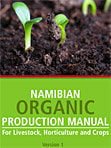2014 Farm Assessments
Certified organic
Blumfelde
Farm Springbockvley
Judith Isele
iselkuel@iway.na
Tel 062 581 606
Beef & lamb
Grootfontein
Farm Eichenbach
Ulf-Dieter Voigts, Ralph & Christiane Ahlenstorf
ralph.ahlenstorf@krumhuk.com.na
Tel. 061 233 645
White and yellow maize, sunflowers, sorghum, cowpeas, lucerne, various cereals, beef
Okahandja
Greenspot Organics
Manjo Smith
info@greenspot.com.na
Tel 081 1295575
Vegetables, herbs and fruit
Bellissima Farming
Suzette & Thys van Vuuren
suzette@organicnamibia.com
Tel 081 1270681
Vegetables and herbs
Steinhausen
Farm Rogers
Ina and Ernst-Ludwig Cramer
ina@cramer.com.na
Tel 062 561 424
Dairy, ice-cream, beef
Windhoek
Farm Krumhuk
Ulf-Dieter Voigts, Ralph & Christiane Ahlenstorf
info@krumhuk.com.na
Tel 061 233 645
Chicken (eggs and meat), beef, milk, vegetables, herbs and fruit
In conversion
Dordabis
Green Sheep Namibia
Anne & Wolfgang Ramdohr
Organic status: 1st year of conversion
veggie@greensheep-namibia.com
Tel 062 573 524
Vegetables, fruit, herbs
Kombat
Farm Pfeffelbach and Farm Altona
Steffi & Gernot Eggert
gheggert@gmail.com
Tel 081 1242720
Maize, sunflowers, sorghum, cowpeas, vegetables, fruit
2013 Farm Assessments
Feedback on NOA Farm Assessments
NOA assesses farms according to IFOAM’s Participatory Guarantee Systems (PGS).
The NOA PGS system is based on a complete transparent, formal, and systemised decision making process, which includes stakeholder engagement, as well as direct communication between producers, consumers and other stakeholders.
Each farm is assessed annually, where after a certificate is issued to indicate the Organic Status that the produce carries.
2013 Assessment Results: Greenspot Organics, Manjo Smith
The farm was assessed on 23 Feb 2013 with the following results:
1. Vegetables and herbs: Full Organic Status
2. Eggs: Full Organic Status
3. Dairy products: Non Organic Status. Not requested for PGS Assessment, as not completely compliant with the NOA standards.
Assessors: Edith Kalka Ina Cramer Stephen Barrow Suzette Janse van Vuuren |
Observers: Dieter Morsbach Martha Natanael |
Conditions
1. A letter confirming the EM (Effective Micro Organisms) to be free of GMOs has to be submitted to NOA
2. A new soil test has to be available for the next assessment (last one is from 2009)
Recommendations:
1. A clearer differentiation regarding the labeling of organic and non organic dairy products would be preferred by the PGS.
Organic Mark usage:
1. The “Namibian Organic” mark may be used on vegetables, herbs and eggs
2. The dairy products may not indicate any Organic Status
2013 Assessment Results: Bellissima Farming, Suzette Janse van Vuuren
Bellissima Farming was assessed on 23 Feb 2013 with the following results:
1. Vegetables and herbs, Plot 77: Organic in Conversion, year 2 of 3
2. Vegetables and herbs, Plot 57C: Organic in Conversion, year 3 of 3
3. Eggs: Full Organic Status
Assessors: Edith Kalka Ina Cramer Stephen Barrow Manjo Smith |
Observers: Willem van Schalkwyk Thys Janse van Vuuren |
Conditions:
1. For the next assessment, NOA PGS expects an improvement of record keeping:
a) field history
b) planting dates / places
c) application of biological products & soil amendments
2. Removal of Gerbera plants within one year; physical separation of flowers and organic veggies
3. Shade cloth curtain to be put up between flowers & veggies
4. Soil test needs to be done before next assessments
5. Map to be drawn and submitted showing the current Gerbera fields, showing prevailing winds, etc.
6. Green manure has to be planted on Gerbera lands before vegetable crop is planted
Organic Mark usage:
The “Namibian Organic in Conversion” mark may be used on vegetables, herbs
The “Namibian Organic” mark may be used on the eggs
2012/2013 Pre-Assessment Results: Humulus Horticultural cc, Dirk Wölbling
An extensive pre-assessment was completed during Jan 2013 with the following results:
1. Land currently under vegetable production could receive “Organic in Conversion” status, if certain conditions are met.
2. Land currently under lucerne, which will be used for vegetables in the near future, will not achieve organic status, as these lands are irrigated with sewage water. Sewage water is not allowed according to NOA’s Organic Standards.
Pre-Assessment Team:
Manjo Smith
Stephen Barrow
Ina Cramer
Edith Kalka
With input from various expert resources regarding the usage of sewage water for irrigation
Conditions:
1. The existing vegetable lands, which are irrigated with borehole water, can receive Organic in Conversion status according to split production standards, on the following conditions:
1.1 Humulus must ensure that no contamination of organic vegetables by sewage water is possible through the workers
1.2 The spray drift risk through the sewage water irrigation must completely be eliminated. The sprinklers must be replaced with drip irrigation on the lucerne land.
1.3 Vegetables have to be washed with drinking water before packaging.
1.4 Green material from the lucerne fields irrigated with sewage water may only be used if a Compost Management Plan is submitted to NOA and approved, where it is clear that associated sewage water risk is elminiated during the composting process. In the absence of a proper management programme, contaminated lucerne may not be used as an input in the compost.
2. Land, irrigated with sewage water, does not comply with the NOA Standards. However, the lucerne fields can be considered for Organic in Conversion status after a relevant conversion period, and after the land is irrigated with borehole water. Documented proof needs be submitted by Humulus guaranteeing that the products produced in this soil do not pose any health risk to consumers caused by the prior long term use of sewage water. NOA’s specific concern is the possible presence of pathogens, especially helminths, as well as other prohibited / toxic chemicals or heavy metals.
3. Based on the fact that (1) sewage water is not allowed in any part of organic production, and (2) that the current production system may pose human health risks, NOA has requested Humulus to remove any reference to “Organic” or “Bio in its marketing material, as this is a mis-representation of the term “organic”. (NOA standards Section 11: Labelling Point 6). Associating organic with sewage water usage may negatively influence the development and credibility of the Organic Sector in Namibia.
4. NOA appreciates the effort by Humulus Horticultural cc to make use of alternative water resources in order to save water. However, Organic in Conversion or Full Organic Status can only be awarded if there is full compliance with the NOA’s standards.
Decisions by Humlus:
1. Humulus rejected NOA’s proposal of a split production approach, as the company feels that the lands irrigated with sewage water are part of the long term crop rotation plan.
2. Dirk Wölbling withdrew his application for a NOA PGS Assessment and resigned from the NOA Board.
Organic Mark Usage:
Humulus Horticultural cc may not use the the NOA mark and has been requested not refer to produce as Organic or Bio as this is a mis-representation of these terms.




